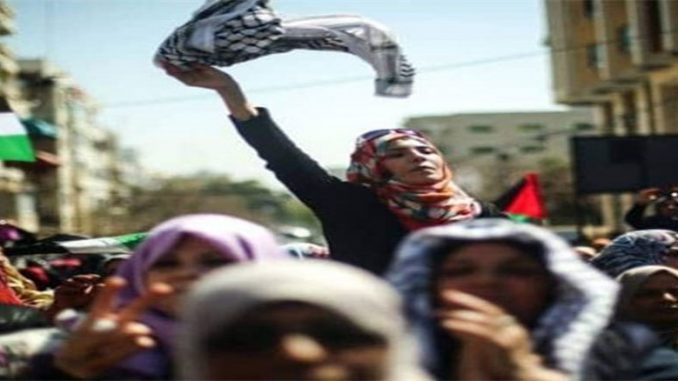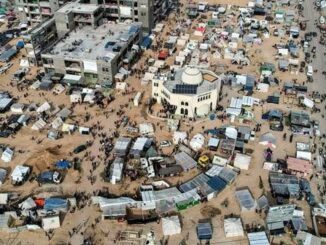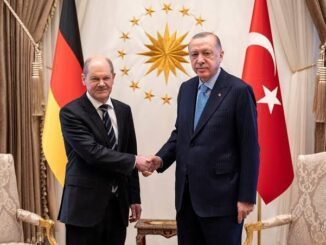
The United Nations Commission on the Status of Women approved a draft resolution on Saturday regarding the status of Palestinian women, including strengthening economic and social policies to enhance the situation of women in the occupied territory, while strongly condemning Israel’s human rights violations in the Palestinian territory.
The draft resolution, titled “situation of and assistance to Palestinian women,” was adopted with 30 countries voting in favor and 12 abstentions. Israel was the only country to vote against the resolution.
The text of the resolution expressed “deep concern” over the “ongoing illegal Israeli occupation and all of its manifestations,” specifically outlining the effects Israel’s illegal settlement construction, continued home demolitions, and imprisonment has had on Palestinian women.
The UN also cited the high rates of poverty in the Palestinian territory, along with “unemployment, food insecurity, inadequate water supply and unsafe drinking water, shortages of electricity and fuel, incidents of domestic violence and declining health, education and living standards, including the rising incidence of trauma and the decline in psychological well-being,” as having an increasingly adverse effect on the women, particularly in the besieged Gaza Strip.
The resolution also noted the UN’s “grave concern” over “all acts of violence, intimidation and provocation by Israeli settlers against Palestinian civilians,” while highlighting the “excessive and indiscriminate use of force by Israeli occupying forces” that has caused the deaths of scores of Palestinian civilians, including women and girls.
The situation in the Gaza Strip was underscored in the resolution, particularly the effects following Israel’s 2014 military offensive that left thousands of Palestinian civilians killed, including women and children, and the devastating toll it has taken on the coastal enclave’s basic infrastructure.
The UN encouraged the international community to “ensure accountability for all violations of international humanitarian law and international human rights law in order to end impunity, ensure justice, deter further violations, protect civilians and promote peace,” and to continue providing urgent assistance to Palestinians suffering from a nearly half century Israeli military occupation and a decade-long Israeli siege.
The UN “reaffirms that the Israeli occupation remains the major obstacle for Palestinian women with regard to their advancement, self-reliance and integration in the development of their society,” the resolution read, while highlighting the importance of increasing Palestinian women’s roles in decision-making in “conflict prevention and resolution,” and their equal participation in solving all aspects of the conflict.
A statement released by the UN following the passage of the draft resolution stated that the United States representative had called the report “biased,” and that the US delegation was opposed to the “one-sided condemnations” of Israeli violations against Palestinians.
Meanwhile, Spain’s representative expressed the delegation’s “deep concern” over the impact the Israeli-Palestinian conflict has had on Palestinian women in response to the resolution. However, Spain had abstained from voting owing to concerns over the text of the resolution that they said expressed issues that should be dealt with by the General Assembly.
Israel’s representative said that the resolution “had nothing to do with the situation of women,” according to the UN’s statement. Instead of outlining serious issues affecting women, the Israeli representative said, the aim of the resolution was to “attack Israel,” adding that Israel had “always been committed to improving women’s lives everywhere.”
The Palestinian representative, in contrast, applauded the resolution saying that it “reaffirmed the fundamental legal principles underlying the search for a just, lasting and peaceful solution to the Israeli-Palestinian conflict,” according to the UN statement.
“If Israel were really supportive of Palestinian women everywhere, as we have just heard, then the only thing that should be done is for it to end its occupation,” the representative was quoted as saying.
Meanwhile, the United Nations Human Rights Council’s (UNHRC) on Friday adopted four resolutions concerning the human rights situation in the Palestinian territory, including a resolution that aims to ensure accountability for human rights violations committed by Israel in the occupied West Bank, besieged Gaza Strip, and occupied East Jerusalem and upholding Palestinians’ right to self-determination.
Critics have pointed out that multiple UN resolutions condemning Israeli policies in the Palestinian territory have been previously passed, but the lack of political will to enforce such measures has remained clear, with Israeli authorities in 2016 approving thousands of new settler units on occupied Palestinian land and allocating millions of dollars to the expansion of settlements.
Furthermore, a report published recently by a UN agency that accused Israel of imposing apartheid policies against Palestinians — the first time a UN organization explicitly used the term “apartheid,” which human rights groups have long used to describe Israeli policies — was withdrawn at the bidding of UN Secretary-General Antonio Guterres, reportedly following pressure from Israel and other UN member states.



